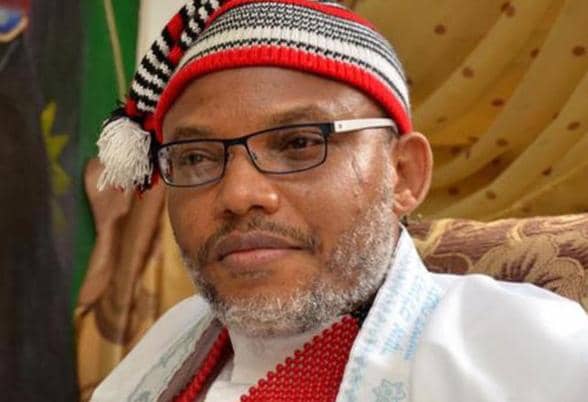Photo caption: IPOB leader, Mazi Nnamdi Kanu
The terrorism and treason trial of the leader of the separatist Indigenous People of Biafra, Nnamdi Kanu, opened on Tuesday before the Federal High Court in Abuja with the proseuction tendering several exhibits, including Radio Biafra equipment.
At the trial, Kanu maintained that he is not a violent person as alleged by the Federal Government.
Instead, he claimed that his fight is solely for the emancipation of the people in the South-East, South-South, and parts of Benue and Kogi states.
Kanu made the statement in a written document submitted to the Department of State Services on October 15, 2015, in Lagos.
The statement was read aloud in open court during the resumed hearing of his terrorism trial.
Kanu is facing seven counts of terrorism brought against him by the Federal Government.
He was first arrested on October 14, 2015, upon his return to Nigeria from the United Kingdom. He was granted bail in 2017 on health grounds after being detained at the Kuje Correctional Centre.
However, Kanu fled to the United Kingdom after his release, only to be re-arrested in Kenya in 2021 and brought back to Nigeria, where he was detained by the DSS.
Initially facing 15 counts of terrorism and treason, eight charges were dropped by the trial court on April 8, 2022, for lack of merit.
In 2022, the Court of Appeal in Abuja ruled in Kanu’s favor, vacating the charges and ordering his release.
However, the Federal Government appealed to the Supreme Court, which, on December 15, 2023, reversed the Court of Appeal’s ruling and directed Kanu to return to trial on the remaining seven counts.
At Tuesday’s hearing, Federal Government counsel, Adegboyega Awomolo (SAN), requested that the identities of witnesses be kept confidential due to security concerns and the sensitive nature of the case.
The court ruled that while Kanu must be able to see the witnesses, they would testify behind a screen to protect their identities.
Kanu’s defence team, led by Kanu Agabi (SAN) and supported by four senior advocates, did not object to the request.
They, however, sought reciprocal cooperation from the Federal Government regarding Kanu’s bail application.
The prosecution’s first witness, identified as Mr. A.A.A., an 18-year DSS operative, testified behind a screen, recounting the events of Kanu’s arrest at the Golden Tulip Hotel in Lagos on October 14, 2015.
He described how the DSS, acting on intelligence, initially had difficulty locating Kanu, as the hotel staff claimed he was not a guest.
After receiving an order from their director, the DSS conducted a room-to-room search and found Kanu in Room 303 with a woman named Maria Ibezimakor.
Mr. A.A.A. stated that Kanu resisted arrest, head-butting one of the officers.
During the search, the DSS found a room resembling a broadcasting studio, containing various broadcasting equipment.
The items recovered, which included laptops, flash drives, microphones, mixers, pamphlets, and other materials linked to IPOB, were brought to court in four suitcases.
Kanu confirmed ownership of the equipment during interrogation, which was also admitted as evidence.
Mr. A.A.A. further testified that while they did not initially recover Kanu’s passport, the hotel manager brought the passports to their office the following morning.
The passports, bearing the name “Okwu-Kanu Nwannekaenyi Nnamdi Ngozichukwu,” were also admitted as evidence.
The witness also revealed that Kanu had checked in under the name “Nwannekaenyi Ezebuiro” and that two other women were found in another room with the same name.
The DSS also played a CD of Kanu’s interrogation, which was recorded the following day.
In the video, Kanu confirmed that he was involved in the struggle for self-determination and that he had set up Radio Biafra.
He acknowledged that he had not registered the radio station with the National Broadcasting Commission because he did not expect to receive a license.
Kanu stressed that his actions were not violent and that freedom fighting is a fundamental right, as recognised by the United Nations Charter.
He emphasised that he had never been involved in any violent activity and had been interrogated by the DSS without legal representation, as required by law.
The court admitted both the statement and video clips as evidence.
The trial was adjourned to May 2 for cross-examination and to hear testimony from a second prosecution witness.



